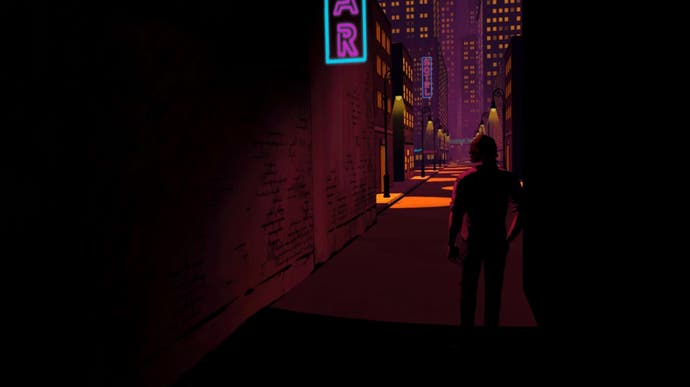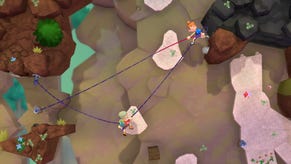Telltale's final year: a story cut short
"When we got the news, people cried..."
"No one knew what was happening; there was no warning. When we got the news, people cried, hugged, or stared blankly ahead. In the aftermath, people wondered what they would do without health insurance, what would happen with their work visas, what to tell their families. For me, it was a day of mind-numbing shock. The full weight of what had happened and what it meant going forward - not being in that office, not working with my team, not being on a project I'd spent over a year on - took weeks to sink in."
That's Mary Kenney, a video game writer who worked at Telltale before its closure earlier this year. Her retelling of the events of 21st September 2018 depicts a studio of people in mourning for their work, shocked at the situation that was pushed upon them and worried about their future. Telltale was dead and all of a sudden 250 people had lost their jobs.
It would later come to light that the abrupt departure of a major financial backer was the smoking gun. But what did the passionate creators within Telltale experience during its final year? What was the human cost of Telltale's final act? To find out, I talked to several ex-Telltale employees, some of whom wished to remain anonymous in order to protect their careers, about their experience at Telltale, and the highs and lows of working there in its final months.
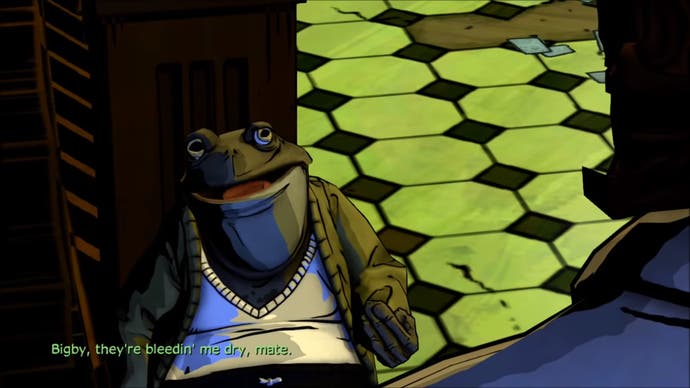
While Telltale's closure shocked the video game world, for many staff the writing was on the wall. A myriad of setbacks and pitfalls befell the studio in recent years, ranging from influential members of senior staff departing to mass layoffs back in 2017, all occurring amid consistently lacklustre sales for new releases. "Anyone with access to SteamSpy or App Annie could see that the games weren't selling, never mind hitting the completely ridiculous sales goals the marketing department were hoping for and presented to the board," one person who worked at Telltale said.
Cracks would appear at regular intervals. Telltale held annual meetings where sales numbers and projections were made available to all staff, one source said. But these pep-talks failed to have the desired effect.
"Through these meetings, it was very clear the last truly great game from the studio was Wolf, which reviewed well and moved slightly profitable numbers, or Tales from the Borderlands, which had great reviews but dismal sales," one source said.
While most at Telltale were familiar with the studio's games' diminishing returns, many teams focused on creating rather than dwelling on what disaster might occur down the line. When asked if the sales numbers affected her negatively, Kenney replied: "For some, I'm sure it did, especially people who had been in the industry longer and were considering the long-term effects. For me, creating games has always been about the people playing them, not so much the numbers. Seeing our fans' enthusiasm and love for the project I was on kept my spirits high, and continues to do so even though I'm no longer working on it."
However, some staff were frustrated by what they considered to be unrealistic targets set by higher-ups. "The Board and publishing were always predicting and budgeting for another The Walking Dead: Season One success, but never gave projects the time, money and resources to really make that a reality," said a source. "There was a brief ray of light with the sales of Minecraft: Season One, but the deal Telltale inked with Mojang/Microsoft was so bad, Telltale didn't see a lot of the returns from the game's moderate sales."
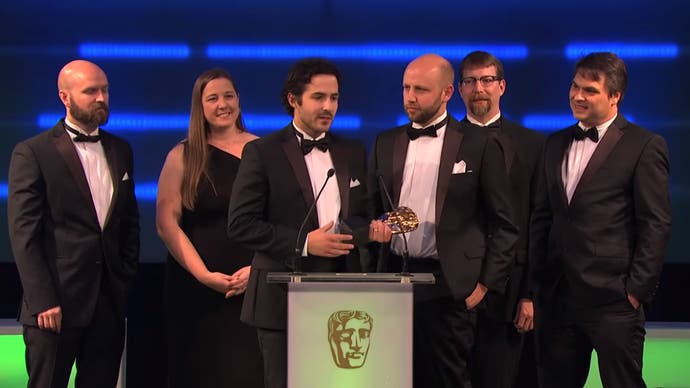
There was also concern raised regarding the sequels Telltale was making, especially after lacking returns from previous instalments. "It was the choices of the projects that ruined my optimism for the studio's future," said one person who worked at Telltale. "If something like The Walking Dead: Season Two did a fraction of sales of the first season, and the Michonne mini-series tanked, what made people think Season Three, let alone Season Four, was a good idea? After The Walking Dead: Season One, very few people from creative had any say about what projects the studio took on. It was all led by the marketing department and that lack of a voice destroyed the creative team's enthusiasm."
This is not to say Telltale was during this time a ship waiting to sink. Throughout the studio's many teams, including Mary Kenney's narrative team, morale remained high. "This might be surprising, but the last year at Telltale was positive, even optimistic," she said. "I can't speak for every team, but on mine, the culture became more collaborative and open to creative risk-taking as the year went on."
This vigorous attitude towards work was put towards some highly-anticipated projects. The Walking Dead's final season, which would conclude the series that brought Telltale the surge of praise back in 2012, fell short of releasing its third episode before the plug was pulled on the studio. While Skybound Games will finish the series, giving both the team who worked on it and the fans some sort of closure, other series were not so fortunate.
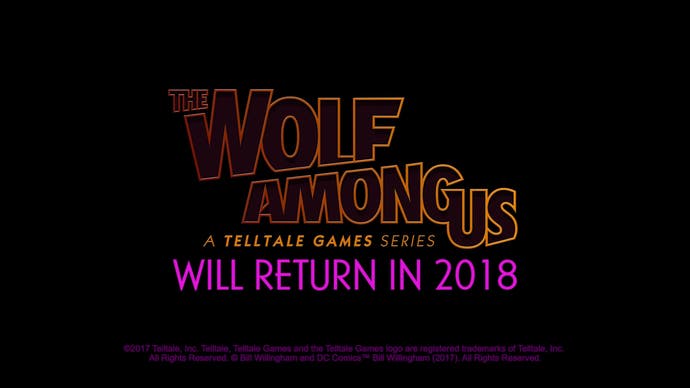
The Wolf Among Us' second season was one such casualty of Telltale's closure. The sequel to the critically-acclaimed adaptation of Bill Willingham's Fables series, Wolf Among Us 2 barely got started, so small and lacking in budget was the team working on it. "[The budget was] shoe-string, even by Telltale standards," said an ex-staff member. "Everybody knew Wolf 1 was a critical success, but not a commercial hit. I think people came into it realising they were making a boutique product. At one point the season was going to be three episodes."
Proper development of The Wolf Among Us' second season started in the summer of 2017. An announcement trailer was released, featuring many key staff on the project recounting what made the first season special. Thanking the fans and declaring a 2018 release date, the team exuded a confident "Wolf is back" attitude in public, but even then there were doubts internally. "Even when the marketing team recorded the Wolf 2 announcement trailer, many people within the studio doubted it would ever see the light of day," said a source.
With these setbacks, The World Among Us' second season was cancelled before it could finish early development. According to an artist assigned to Wolf 2: "It was so early on that we didn't have much apart from some concept art and a bit of white boxing for gameplay prototyping." That's not to say the Wolf 2 development team had nothing to show for their hard work. According to sources familiar with the project, a season overview and even a good amount of the first episode script was completed. The game wasn't going to be a direct sequel. Rather, it would have followed the next adventures of Bigby and Snow some time after the events of the first season.
The Wolf Among Us Season Two's narrative team declined to comment on the record for this report. However, one ex-member did state: "I hope to talk about the project in great detail someday, but now's not the time."
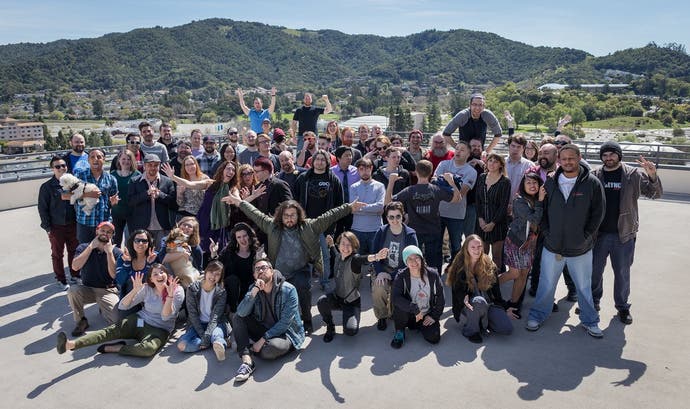
Then there was crunch. Telltale, like so many video game studios, suffered from some brutal working conditions that put enormous strain on staff. In Telltale's final year, crunch only intensified pre-existing pressures. (For more on Telltale's crunch culture, check out this great feature by The Verge.)
"At its worst, this would turn already troublesome writers and designers into hair-trigger monsters that people strategically avoided," said an ex-Telltale member of staff. "This got particularly bad on Batman: S2 and Walking Dead: S4 as the pressure to deliver a successful game increased with each episode. At the end of the day, Telltale's design and creative departments had serious problems with unprofessional cliques and favouritism based on personal friendships over merit. Crunch magnified these issues tenfold and department leadership was either at a loss about to address them or simply didn't care."
The pressures of crunch even ate away at the tight-knit studio culture, bringing out the worst in people and creating tension between the overworked many. Ex-staff have told me about colleagues who'd "take their anger management issues out" on their teammates and verbally abuse them during design reviews, and tales of men gaslighting female writers in brainstorming sessions - a change in behaviour that occurred only after being assigned to a gruelling schedule.
This recounting of the detrimental effects of crunch on relationships within Telltale was echoed by former lead narrative designer Rachel Noel, who saw first-hand how crunch was making people myopic. "Instead of focusing on teamwork and collaboration, or even what lies ahead in the future, people became so focused on what they were creating that it was like they had blinders on. It ruined interpersonal relationships and drove people to be incredibly demanding, and often they lost sight of the impact their work had on others."
However, it also seems like there were clear attempts made by those in charge to both minimise crunch and place emphasis on the mental wellbeing on those working at Telltale in its last year. "While crunch may have been the norm previously, during the last year, teams tried to minimise it and encouraged people to take time off if they'd worked extra hours or a weekend," Mary Kenney said. "There were a lot of good managers at Telltale trying to make it a better place to work".
It's during this short-lived period of relative positivity in the face of uncertainty that the rug was pulled from under Telltale. For some, it was just a matter of time. "My last year at Telltale was a struggle to survive a toxic environment, save up some money, and find a nice place to land when the inevitable happened," a source said. "I feel terrible for younger talent at the studio who didn't see these signs and were legitimately shocked each time studio layoffs hit. For many, Telltale was their first exposure to game development and they either couldn't read those signs for what they were or truly believed management when they said they could push through it with hard work and long hours."
Others didn't see the news coming. While layoffs were nothing new to Telltale, a total closure came as a shock to those like Rachel Noel. "A lot of people felt like Stranger Things might not be profitable, and if it wasn't, there would be more layoffs," she said. "The shutdown seemed to take most people, if not everyone, by surprise. I had been given a heads-up about an hour before they made the announcement with a warning to keep it quiet. I was pretty stunned. It wasn't my first lay-off, so I think I took it a little better than the people who had only ever worked there, or were straight out of college."
Despite the sudden closure, Mary Kenney tells me how support from people inside and outside Telltale helped the newly unemployed deal with the news. "The 'ex-Telltalers' headed out to bars and restaurants en masse," she said. "We shared our grief, advice from people who'd gone through this before, anecdotes about what we'd miss. As we all comforted each other, the industry showed up with tweets, emails, even interviews that outlined their support for us. It was overwhelming and humbling to know we were surrounded by so many kind, hardworking, considerate people. It still is.
"Many of us were looking forward to what Telltale hoped to do going forward, things we'd talked about in company meetings for over a year: new plans, new projects, new technology. We weren't anticipating the end. We had a future sketched out, one we were excited about even though we knew it would take a lot of hard work to make it happen."
Telltale's is a story cut short, then. In-development projects were discarded, teams were broken up and developers were cast adrift. But while we may never know what might have come from these plans and projects, we do know the people who made Telltale's much-loved games built them even as they faced brutal crunch and a toxic work culture. The passion Telltale staff had for their work is something I, alongside many others, will miss dearly.
